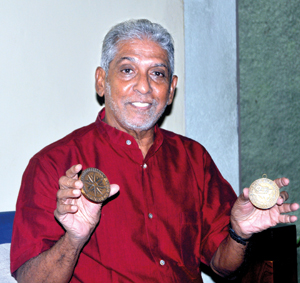Sri Lanka Athletics off Track — Bandula Jayasinghe
Former national athlete Bandula Jayasinghe, a member of the famous 1974 Teheran Asian Games squad, spoke to the Sunday Times of the value and the role a coach plays in grooming a youngster to reach the top.
At the age of 70, Jayasinghe recalled how his talents were recognized by PTI Samarasinghe of Ananda Sastralaya, Kotte, and encouraged him to take up athletics. In those days, the dream of every school athlete is to run in the Public Schools Meet and in the Relay Carnival. Jayasinghe narrated how he rose to national standard, stride by stride, guided by talented coaches.

Bandula Jayasinghe showing couple of his medals won from major events - Pic Ranjith Perera
In those days, to take part the Public Schools Meet, was very competitive. There were Zonal meets, as Colombo was divided into 7 or 8 zones. Likewise, the entire island was demarcated into zones. Only the cream of schoolboys and girls from the island were selected to take part in the Public Schools Meet, which is a highly competitive event. Jayasinghe was very successful at the Meet, as he did well in the track events and in the hurdles.
Going from strength to strength, Jayasinghe was selected for the Indo-Ceylon Schools Athletic Championship Meet in India. Having won Silver in the 200m and 400m events this young lad’s talents were recognised by the governing body.
After leaving school, the ace sprinter joined the Ceylon Track & Field Club (CT&FC) and came under the guidance of qualified coaches such as Lakshman de Alwis, Anthony Abeysinghe and J.R. de Silva. Athletes such as S.L.B. Rosa and W. Wimaladasa too were members of the CT&FC. Coaches at the club groomed Jayasinghe to reach National level.
As there were not many international Meets in 1960′ and ’70′s, international exposure was limited. Jayasinghe was a member of the Sri Lanka team to the 1974 Asian Games in Teheran. With a smile on his face Jayasinghe said the Lankans returned to the island proudly, as they established two Asian Games records. The 1st record was by W. Wimaladasa in the 400m event and the second was by the 4x400m relay team of W. Wimaladsa, A. Premachandra, Sunil Gunawardene and Kosala Sahabandu which won Gold. Jayasinghe failed in the 400m hurdles and was a stand-by for the relay team. He was a member of the Sri Lanka relay team that won a bronze medal at the Asian Athletic Championship in 1975. In the 4×400 relay Jayasinghe along with W. Wimaladasa, A. Premachandra and Dervin Perera clocked 3:13.4secs to finish third behind India and Japan.
Asked about his involvements in athletics, after retirement, Jayasinghe said he was not involved in any form, but was well informed by his colleagues, such as the late Dervin Perera, Sunil Gunawardena and K.G. Badra. He also said, “10 to 15 years ago, we had top class athletes, but now the standard has dropped drastically, and I am not happy the way athletics is conducted at present.”
This former national star went on to say that, “Sri Lanka is rich in talent which has to be harnessed. This talent should go under the wings of the right coaches. Nowadays coaches want instance results. As a result, athletes resort to energy producing supplements and burn out prematurely. It’s a tragedy.”
Jayasinghe pointed out that Sri Lanka athletics is suffering due to the lack of knowledgeable and well trained coaches. Present day coaches are not up to date with the latest developments and techniques. The coaches should be properly coached. The first task is to upgrade them. There should be coaches trained to take over different age group athletes from Under-13 to U-19 and above. This is not happening at the moment, and is the main drawback in standards.
The other point that Jayasinghe spoke of the sudden fading of athletes who come to the limelight. He said the main cause is employment. During their days, most of the national athletes were absorbed into public or private institutions. Presently, only the 3 Armed Forces provide them employment and all the facilities.
As most of the present day athletes come from rural areas, their main task is to find suitable employment with a fairly good salary, for their nourishment and day to day expenses, to remain in athletics. That will help them reach high standards.
On conclusion, Jayasinghe spoke of the need for a proper National policy for athletics, that will help take it to a top level. Governments and ministers may come and go, but the national policy should be carried forward. A long term plan with good advisers who have the ability to recognise talent and nurture them for three to four years, will enable Sri Lanka dominate in the Asian region.


